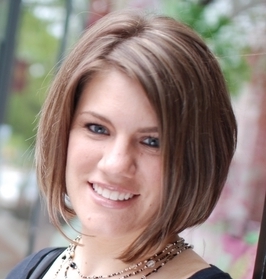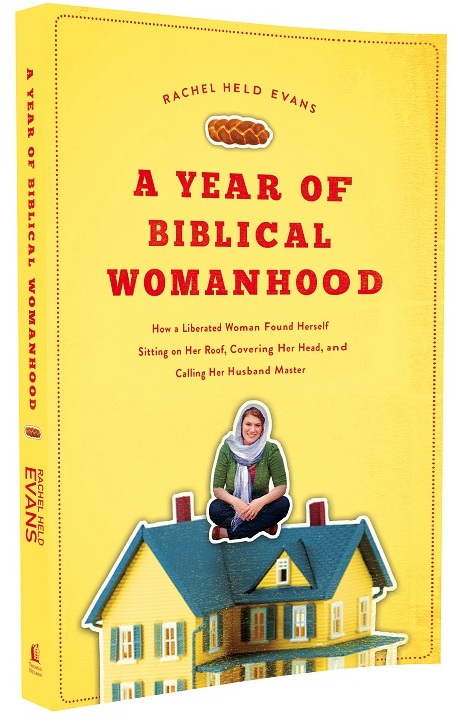By Bob Allen
Weeks before its official release, advance copies of a book challenging the assumption that the Bible prescribes a single model for “biblical” womanhood aren’t finding fans among conservative evangelicals who believe roles for husbands and wives described in Scripture still apply today.
 LifeWay Christian Resources of the Southern Baptist Convention recently decided not to sell Rachel Held Evans’ A Year of Biblical Womanhood, citing product-selection criteria of “alignment with evangelical beliefs, past sales by an author and how they fit within LifeWay’s values and vision.”
LifeWay Christian Resources of the Southern Baptist Convention recently decided not to sell Rachel Held Evans’ A Year of Biblical Womanhood, citing product-selection criteria of “alignment with evangelical beliefs, past sales by an author and how they fit within LifeWay’s values and vision.”
The Council for Biblical Manhood and Womanhood, an organization based on the campus of Southern Baptist Theological Seminary in Louisville, Ky., described Evans’ view of Scripture in the book as “troubling.”
A recent panel discussion at Southern Seminary accused the book of “mocking” the truthfulness of Scripture.
Boyce College Professor Denny Burk questioned Evans’ inclusion in a Christianity Today list of “Top 50 women to watch,” describing her appropriation of the evangelical label for herself as a “radically revisionist” understanding of the term.
Raised in a small-town evangelical culture in Dayton, Tenn., and then finding her own marriage didn’t conform to the traditional roles of headship and submission espoused by almost everyone she knew, Evans embarked on a laboratory experiment of attempting for one year to follow literally every rule the Bible prescribes.
The result, the book subtitled “how a liberated woman found herself sitting on her roof, covering her head and calling her husband master,” has received favorable reviews from evangelicals who share her egalitarian view of male/female relationships.
Patheos blogger Roger Olson, a professor of theology at Baylor University’s George W. Truett Theological Seminary, called it “a delightful read — funny, sad, bewildering, shocking, thought-provoking.”
Others who hold a “complementarian” position, which affirms that men and women are equal in God’s image but assigned complementary differences in role and function in the church and home, viewed it with alarm.
“As I read the book, it became increasingly clear to me of one theme: God’s word was on trial,” freelance journalist and writer Trillia Newbell opined in a blog for John Piper’s Desiring God Ministries. “It was the court of Rachel Held Evans. She was the prosecution, judge and jury. The verdict was out. And with authority and confidence, she would have the final word on womanhood.”
Newbell, managing editor for Women of God, an online magazine launched last year, said throughout the book “Evans works to prove that the Bible is not without error and therefore cannot be applied literally — and in some cases cannot be trusted.”
 Newbell faulted Evans for discussing the horrors of various Old Testament passages regarding women while failing to interpret the purpose behind those laws in ways that make sense. “She never introduces the redemptive history of Scripture,” Newbell complained. “Evans will not allow redemptive history into her courtroom.”
Newbell faulted Evans for discussing the horrors of various Old Testament passages regarding women while failing to interpret the purpose behind those laws in ways that make sense. “She never introduces the redemptive history of Scripture,” Newbell complained. “Evans will not allow redemptive history into her courtroom.”
Instead of persuading complementarians, Newbell predicted Evans’ book “will reinforce the views of non-Christian men and women who seek validation for thinking Christians are foolish for following the Bible closely.”
Russell Moore, dean of the School of Theology and senior vice president for academic administration at Southern Seminary, alluded to Evans’ book in an hour-long panel discussion Sept. 27 on new challenges to the doctrine of biblical inerrancy.
“One of the things that I see now that I don’t think previous generations saw is an overt and outright mocking of the idea of the truthfulness of Scripture,” Moore said. “You’ll have evangelical publishers, for instance, publishing books that take Bible passages about speaking of women and how women are to act and mocking it — having a year of living like a biblical woman. I mean, that’s something you just didn’t see in previous generations, with that kind of overt derision.”
Some observers predicted it would only be a matter of time before proponents of biblical patriarchy anxious about the potential influence of A Year of Biblical Womanhood would attempt to discredit the author. Southern Baptist leaders went out of their way to criticize previous popular books by progressive evangelical authors Rob Bell and Brian McLaren.
For her part, Evans said the fact that the Bible lends itself to competing interpretations “should be cause for celebration rather than dismay.”
“For constructive dialogue to happen, Christians must stop conflating differences in interpretation of Scripture with differences in commitment to Scripture,” Evans wrote in her blog. “We must respond to one another’s questions, arguments and ideas in kind, with more questions, arguments and ideas, rather than avoiding the conversation altogether by dismissing one another as unfaithful.”
